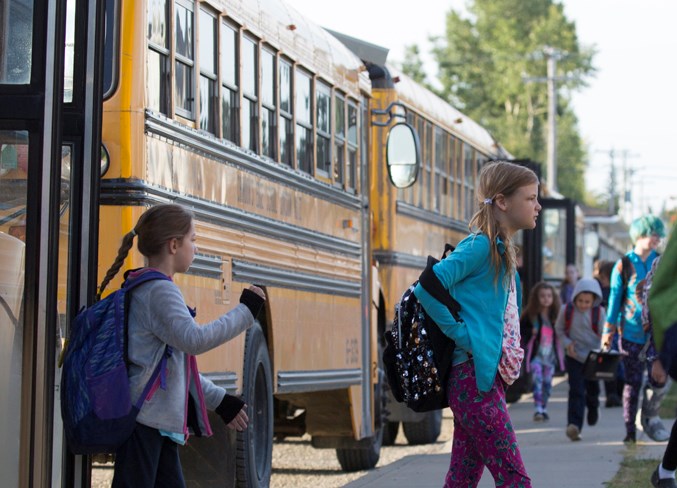Chinook’s Edge School Division does not plan to impose new school busing fees in the jurisdiction this school year, says superintendent Kurt Sacher.
Effective Sept. 1, new school transportation regulations in the provincial Education Act state that a school board may charge the parent of a student receiving transportation provided by the board any fee determined by the board.
The new regulations replace the previous NDP government’s ban on most busing fees.
“We won’t be making any changes for this school year (2019-20),” said Sacher. “The board re-examines annually its fee structure so now that they have more flexibility, I can’t predict whether that will make any difference or not. They won’t re-examine that for another year (until at least the 2020-21 school year).”
The division already has some busing fees for specific situations, such as for those students attending schools of their choice and for in-town busing, but not for the typical ridership, he said.
The division’s school busing is currently funded by money it receives from the government and has in the past included the use of instructional funding to help fund busing, he said.
“Unfortunately instruction ends up funding an underfunded rural transportation system, so we are hoping to make some headway with this new government in that regard,” he said.
New regulations regarding school fees, including busing fees, came into effect on Sept. 1.
“A fee charged under Section 59(3) of the Act respecting the transportation of students in accordance with Section 59 (1) of the Act and this regulation must not exceed the average difference per student between the estimated cost to the board of transporting those students,” the new regulation states in part.
The fee referred to in the section must be established in accordance with the board policy.
“A board must establish, maintain and implement policies respecting the transportation of students and the transportation fees it proposed to charge” and the policy must include “a requirement to demonstrate to parents the need to charge any transportation fee, including its amount, the circumstances under which any transportation fee may be waived or refunded.
“A board must, prior to the commencement of each school year, establish a schedule of transportation fees, in the form, if any, required by the minister, listing each type of transportation fee, with its amount, that may be charged in that school year.”
NDP education critic Sarah Hoffman calls lifting the ban on transportation fees bad news for students and parents.
“The UCP is clearly prepared to off-load the cost of busing kids onto working parents,” said Hoffman. “By not providing proper funding to school boards for transportation, boards will have no choice but to charge parents more.
“Parents deserve affordable and predictable school bus fees, but instead the minister (of education) is shirking her responsibility and forcing school boards to take the fall for her government’s funding cuts.”
As well as allowing for new busing fees, the province is also planning to cut hundreds of teaching positions, she said.
SECLUSION ROOM BAN LIFTED
Meanwhile, the division does not plan to create so-called seclusion rooms despite the recent UCP decision to allow them to be re-established after being banned by the previous NDP government, says superintendent Sacher.
The rooms are used to temporarily place students who are having control difficulties.
“I have received numerous letters from our parents in the school system asking me to rethink the former government’s short-sighted approach to seclusion rooms and student safety,” Adriana LaGrange, minister of education, said in a press release.
New standards for the rooms will be in place by the end of October following consultations with stakeholder groups, said LaGrange, noting that new reporting requirements will also be put in place.
Chinook’s Edge superintendent Sacher says there are no plans to create seclusion rooms in the division.
“In our schools in Chinook’s Edge we don’t have a need for them,” said Sacher. “We have no need to go to that extreme.
“With the bulk of our schools we have what we call 'feeling rooms.' They are never locked and are always supervised by staff, so it’s really a non-issue for us.
“If a student is having difficulties regulating their emotions, then a staff member will take them into one of the rooms and help them with a variety of strategies so that they can calm themselves down. They are not locked in there and they are not left in there.”
Inclusion Alberta, a group that advocates on behalf of children and adults with disabilities, says standards must be strengthened to “prohibit the use of locked isolation or seclusion rooms and to require prior provincial approval for the use of seclusion and/or restraint.
“Having a quiet space where a child with developmental disabilities can go when needed is not equivalent to locking them in an isolation room.”
There are more than 11,000 students in the Innisfail-headquartered Chinook’s Edge School Division.



